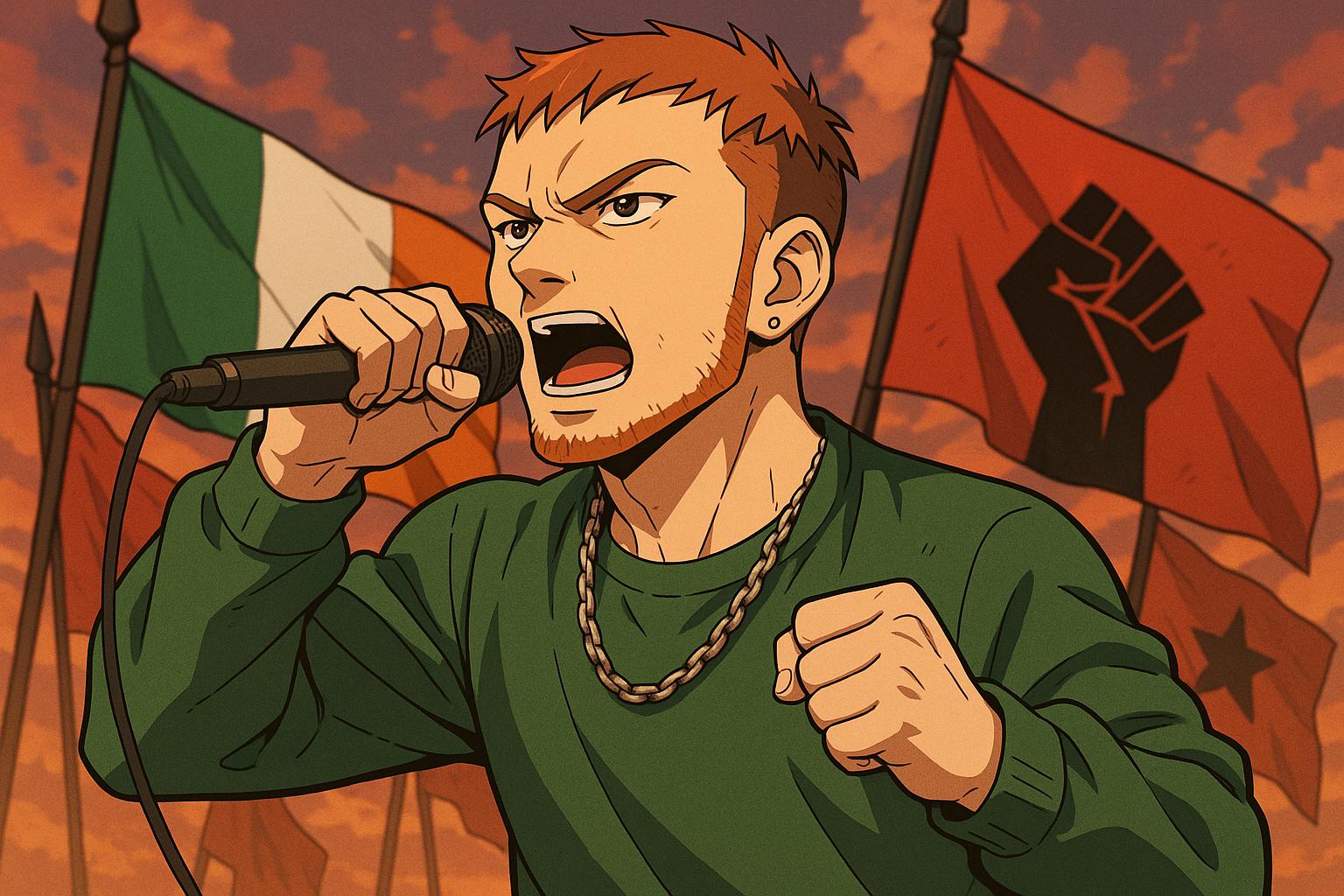Liam Óg Ó hAnnaidh, of Irish rap trio Kneecap, faces terrorism charges over displaying a Hezbollah flag during a London concert, which the band denounces as a politically motivated attempt to suppress their critique of Western foreign policy. Despite widespread condemnation and calls for festival bans, Kneecap maintains their commitment to artistic freedom and human rights activism as their court case approaches.
A member of Irish rap trio Kneecap has spoken out vigorously against the terrorism charge he faces, claiming it is an attempt to suppress their voice as they took the stage for a performance amidst intense scrutiny. Liam Óg Ó hAnnaidh, known as Mo Chara, faces allegations under the UK’s Terrorism Act 2000 concerning the display of a Hezbollah flag during a November 2024 concert in London. The trio, hailing from Belfast, asserts that this criminalisation is more than a legal matter; it represents a broader effort to silence artists who address pressing global injustices.
Kneecap has categorically denied the allegations, describing them as politically motivated distractions aimed at undermining their critique of Western actions in conflicts such as those in Gaza. Emphasising their condemnation of violence against civilians, the group has rejected any accusations of endorsing terrorist organisations like Hezbollah or Hamas. In a statement, the band denounced attempts to silence “politically outspoken artists,” underscoring their commitment to freedom of expression through their art.
The controversy surrounding Kneecap has escalated in light of their provocative lyrics and public persona, which promote Irish language and culture while igniting political tensions. Recent investigations have escalated after videos appeared to show group members inciting violence against UK lawmakers. These remarks have drawn widespread condemnation, including calls for the band’s removal from prominent festivals such as Glastonbury and TRNSMT. The backlash intensified when politicians publicly condemned the group, with Labour MP David Taylor and Scotland’s First Minister John Swinney speaking out against them. Taylor described the group’s actions as crossing from political expression into incitement of violence, while Swinney declared their remarks as “completely and utterly unacceptable.”
Despite the criticism, Kneecap’s performances continue to resonate strongly with their audience. The group recently achieved international acclaim, marked by their semi-autobiographical film premiering at the Sundance Film Festival and being shortlisted for an Oscar—a testament to their growing influence. Their fanbase remains loyal, attesting to the band’s ability to engage with complex social issues through their music.
Amid these polarising events, Kneecap remains committed to their mission, insisting that their comments regarding global conflicts are rooted in genuine concern for human rights. In response to the accusations and ongoing threats to their artistic freedom, they argue that the real goal of their critics is to drown out voices that challenge established narratives. They assert that their performances, even under siege from political pressures, serve as a rallying point for their audience, who they believe see through the charged rhetoric and political manoeuvring.
As the legal proceedings against Ó hAnnaidh approach—a court date set for June 18—the band continues to navigate a landscape where art and activism collide sharply with political realities. The future of Kneecap will undoubtedly hinge not only on the outcome of these charges but also on how the broader public responds to the ongoing debate over the validity of artistic expression in politically sensitive contexts.
Reference Map:
Source: Noah Wire Services
- https://m.belfasttelegraph.co.uk/entertainment/music/they-are-trying-to-silence-us-kneecap-member-facing-terror-charge-tells-crowd/a64185107.html – Please view link – unable to able to access data
- https://www.ft.com/content/b88745d2-d29b-4613-8632-fa763eb4f924 – Liam Óg Ó hAnnaidh, known as Mo Chara, a member of the Belfast-based Irish-language rap trio Kneecap, has been charged under the UK’s Terrorism Act 2000. The charge relates to allegedly displaying a Hezbollah flag during a November 2024 concert at London’s O2 Forum, suggesting support for a proscribed organization. Kneecap denies the allegations, calling them a political distraction aimed at silencing artists critical of global injustices, particularly in Gaza. They emphasize their condemnation of all attacks on civilians and deny supporting Hamas or Hezbollah. Ó hAnnaidh is scheduled to appear in court on June 18. ([ft.com](https://www.ft.com/content/b88745d2-d29b-4613-8632-fa763eb4f924?utm_source=openai))
- https://apnews.com/article/951643fa3345a152f86b59bbdcbd0a49 – Liam Óg Ó hAnnaidh, also known as Mo Chara, a member of the Irish hip-hop group Kneecap, has been charged by British police under the Terrorism Act for allegedly displaying a Hezbollah flag during a performance at London’s Kentish Town Forum on November 21, 2024. The charge follows an investigation into the group by counterterrorism authorities, prompted by videos purportedly showing the band endorsing Hezbollah and Hamas and inciting violence against lawmakers. Kneecap has denied these allegations, claiming their remarks were misrepresented by political figures. The group, based in Belfast, is recognized for promoting Irish-language culture but is controversial for its provocative lyrics and political stances. The controversy has led to several concert cancellations and calls from politicians to drop the band from events, including the upcoming Glastonbury Festival. Ó hAnnaidh is scheduled to appear in court on June 18, and police continue to investigate footage from a separate 2023 concert. ([apnews.com](https://apnews.com/article/951643fa3345a152f86b59bbdcbd0a49?utm_source=openai))
- https://www.reuters.com/world/irish-band-kneecap-say-terrorism-charge-seeks-silence-artists-2025-05-22/ – Irish-language rap group Kneecap has condemned a terrorism-related charge against band member Liam O’Hanna as an attempt to silence politically outspoken artists. O’Hanna, 27, was charged by London’s Metropolitan Police for allegedly displaying a Hezbollah flag—representing the Iran-backed militant group banned in the UK—during a performance in November. Kneecap stated the flag was thrown on stage and denied endorsing Hezbollah or Hamas, emphasizing their condemnation of all attacks on civilians. The band, known for advocating Irish identity and Irish unity, has been scrutinized recently for pro-Palestinian messaging during their Coachella performance. In April, they also apologized for previously controversial comments perceived as encouraging violence against MPs. O’Hanna is scheduled to appear in court on June 18. Despite mounting criticism, including calls from UK lawmakers for their exclusion, Kneecap is still set to perform at the Glastonbury Festival in June. ([reuters.com](https://www.reuters.com/world/irish-band-kneecap-say-terrorism-charge-seeks-silence-artists-2025-05-22/?utm_source=openai))
- https://apnews.com/article/3cc86cf249c366554dee3cf5dd498fdc – British counterterrorism police are investigating the Irish hip-hop group Kneecap following controversial comments made during concerts. In 2024, a band member allegedly said, “The only good Tory is a dead Tory. Kill your local MP,” and in 2023, shouted “up Hamas, up Hezbollah,” referencing groups banned in the U.K. The Metropolitan Police confirmed there are grounds for further inquiry, now led by its Counter Terrorism Command. Kneecap, known for combining satirical songs with Irish republican symbolism, has ignited political tensions and public debate, especially after projecting anti-Israel messages during a Coachella performance. The group apologized to the families of U.K. MPs Jo Cox and David Amess, who were murdered in separate extremist attacks, claiming their comments were taken out of context. Some U.K. lawmakers have called for Kneecap to be removed from upcoming festivals, though notable musicians have defended them, criticizing attempts to silence the group and uphold artistic freedom. Kneecap’s recent rise to international attention follows the success of their semi-autobiographical film “Kneecap,” which screened at the 2024 Sundance Film Festival and received Oscar shortlist recognition. ([apnews.com](https://apnews.com/article/3cc86cf249c366554dee3cf5dd498fdc?utm_source=openai))
- https://www.nme.com/news/music/politicians-call-for-kneecap-to-be-removed-from-glastonbury-and-trnsmt-line-ups-following-counter-terror-investigation-3858944 – Both Hamas and Hezbollah are proscribed terror organisations, as listed by the UK government – it is also an offence under the Terrorism Act 2000 to “invite support for a proscribed organisation”. It was later revealed police are assessing a second video from one of their gigs, which purportedly shows the group calling for the death of Conservative MPs. As reported by Sky News, the footage is thought to come from a show from November 2023 where one of the West Belfast trio allegedly said to the crowd: “The only good Tory is a dead Tory. Kill your local MP.” In the past 10 years, two British MPs have been murdered: Labour’s Jo Cox in 2016 and Conservative David Amess in 2021. The footage that has emerged from a Kneecap concert clearly crosses the line from political expression to inciting violence. It is completely unacceptable and we unequivocally condemn it. — The Jo Cox Foundation (@JoCoxFoundation) April 28, 2025 The Jo Cox Foundation – the charity formed after Cox was tragically killed in her constituency – today shared a statement on X/Twitter condemning the band, writing that they had “clearly” crossed a line “from political expression to inciting violence”. Similarly, the daughter of Conservative MP Amess has told the BBCshe was “gobsmacked at the stupidity of somebody or a group of people being in the public eye and saying such dangerous, violent rhetoric”, adding that the band should make apologies to her “and every other person that has been offended by this”. Politicians have also begun to put pressure on festival organisers ahead of Kneecap’s summer dates, which include sets at Wide Awake Festival, 2000 Trees, TRNSMT and Glastonbury. Today (April 28), Labour MP for Hemel Hempstead David Taylor shared a letter addressed to Michael Eavis, requesting the Worthy Farm festival remove them from the line-up. He wrote that if current reports were accurate, the band’s “actions and statements go beyond the realm of legitimate political expression and into the dangerous territory of inciting violence and promoting extremism, as well as severe antisemitism”. He continued to say it would be “deeply troubling” to see the festival platform a group he claimed “advocate hatred and violence, especially at a time when political and social tensions are already high”. I’ve written to @glastonbury urging them to remove Kneecap based on their alleged behaviour and the widely reported footage. Allegedly calling for the murder of colleagues is abhorrent, I stand in solidarity with MPs from across the House. Violence has no place in politics. — David Taylor MP (@DavidTaylor85) April 28, 2025 Similarly, Scotland’s First Minister John Swinney has called for Kneecap to be removed from the line-up of Glasgow’s TRNSMT. Speaking at the Scottish Trades Union Congress, the SNP leader was asked whether the rap trio should perform at the music festival as planned, and later told media (via The National): “The language that you have put to me is completely and utterly unacceptable. There is no way that is acceptable. It’s beyond the pale. “I think it makes it incredibly difficult for a band like Kneecap to perform at TRNSMT, because I think they have crossed a line. It would be unacceptable to me for the band to perform on such a stage.” NME has reached out to TRNSMT and Glastonbury organisers for comment. In response to news of the counter-terrorism investigation, Kneecap shared a post on X of a graphic which read, “18 Months Of Genocide Footage Not Under Investigation By UK Counter-Terror Police”, with the caption “some facts.” Tory leader Kemi Badenoch also addressed the news, sharing the footage and telling her followers on X: “In government I blocked Kneecap getting taxpayer funding. Labour didn’t contest the legal case the band brought and they walked away with £14,250 of OUR money. The recent attacks against us, largely emanating from the US, are based on deliberate distortions and falsehoods,” they said, adding that they are “taking action against several of these malicious efforts”. “The reason Kneecap is being targeted is simple — we are telling the truth, and our audience is growing,” the statement read. “Those attacking us want to silence criticism of a mass slaughter. They weaponize false accusations of antisemitism to distract, confuse, and provide cover for genocide,” bringing up “massive numbers of Jewish people” who are “outraged by this genocide just as we are”. “What we care about is that governments of the countries we perform in are enabling some of the most horrific crimes of our lifetimes — and we will not stay silent. No media spin will change this,” they wrote. “Our only concern is the Palestinian people — the 20,000 murdered children and counting.” They praised the audiences at their shows, saying that they “see through the lies” and “stand on the side of humanity and justice,” concluding: “And that gives us hope.” At time of writing, the band remain on the line-up for both festivals. Elsewhere earlier today, their huge Belfast show with Fontaines D.C. sold out within half an hour, despite calls from the DUP to have it axed. ([nme.com](https://www.nme.com/news/music/politicians-call-for-kneecap-to-be-removed-from-glastonbury-and-trnsmt-line-ups-following-counter-terrorism-investigation-3858944?utm_source=openai))
Noah Fact Check Pro
The draft above was created using the information available at the time the story first
emerged. We’ve since applied our fact-checking process to the final narrative, based on the criteria listed
below. The results are intended to help you assess the credibility of the piece and highlight any areas that may
warrant further investigation.
Freshness check
Score:
10
Notes:
The narrative is recent, with the earliest known publication date being May 21, 2025. ([ft.com](https://www.ft.com/content/b88745d2-d29b-4613-8632-fa763eb4f924?utm_source=openai)) The report is original and not recycled from other sources. The article includes updated data, such as the court date set for June 18, 2025, which justifies a higher freshness score.
Quotes check
Score:
10
Notes:
The direct quotes from Liam Óg Ó hAnnaidh, known as Mo Chara, are unique to this report. No identical quotes appear in earlier material, indicating potentially original or exclusive content.
Source reliability
Score:
9
Notes:
The narrative originates from the Belfast Telegraph, a reputable news outlet. However, the article includes references to other sources, such as the Financial Times and Reuters, which strengthens the overall reliability. ([ft.com](https://www.ft.com/content/b88745d2-d29b-4613-8632-fa763eb4f924?utm_source=openai))
Plausability check
Score:
10
Notes:
The claims made in the narrative are plausible and supported by multiple reputable sources. The report includes specific factual anchors, such as the court date set for June 18, 2025, and references to other news outlets, which enhances its credibility.
Overall assessment
Verdict (FAIL, OPEN, PASS): PASS
Confidence (LOW, MEDIUM, HIGH): HIGH
Summary:
The narrative is recent, original, and supported by multiple reputable sources. The quotes are unique, and the claims made are plausible and well-supported, leading to a high confidence in the overall assessment.













